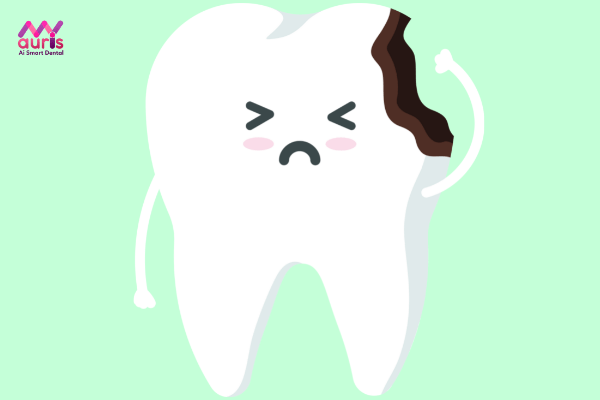Tooth decay is a common condition for various reasons. However, wisdom teeth are hidden deep in the jaw and are difficult to detect and people often ignore them. This affects oral health and the longer it lasts, the more dangerous complications it will lead to. Therefore, how to fix broken wisdom teeth? To answer this issue, don’t skip the article below.
Causes of wisdom teeth breaking
Wisdom teeth are the last teeth to grow on the jaw when reaching adulthood. The teeth are large in size, have complex roots and are located in the innermost position, so it is very difficult to clean and observe abnormalities in these teeth.
Here are some causes ofwisdom tooth decay:
- Trauma: Trauma or external impacts on teeth cause damage and breakage.
- Calcium deficiency: Lack of calcium, a nutrient that makes tooth enamel weak and susceptible to external influences or bacterial attacks, causing brittle, decayed, and easily broken teeth
- Eating a lot of hard foods: Chewing or eating foods that are too hard for a long time causes tooth enamel to weaken and break easily.
- Tooth decay: wisdom teeth are located deep inside and are difficult to clean, and the chewing surface of the teeth has many pits and grooves that easily trap food, creating conditions for bacteria to grow. Furthermore, wisdom teeth often grow crookedly, obliquely, and may be a space away from tooth number 7. Therefore, it is easy for food to get stuck in this gap, which is an environment for bacteria to grow. Bacteria gradually erode tooth enamel, initially only tiny holes are seen, gradually larger brown and dark stains will be seen. And gradually the hard part of the tooth is seriously damaged, causing breakage, accompanied by bad breath and infection, affecting oral health.

Signs of decayed wisdom teeth
A broken wisdom tooth has not affected the dental pulp
At this time, you can feel pain and sensitivity when eating sour, sweet or hot and cold foods. Changes in color on the surface of wisdom teeth, tooth enamel may have brown or black stains, etc. The tooth crown is broken due to bacterial attack, and in this case, if left untreated, it will be fatal.g creates conditions for bacteria to thrive.
The decayed tooth has affected the dental pulp
The pain may be different when there is only a cavity. Because when a tooth is affected by the pulp, there will be unique pain. At this time, the patient can feel constant dull pain, sometimes severe in waves, increasing at night. This affects sleep, the ability to eat and chew, and there are even cases where the pain spreads to the first half of the head along with the position of the decayed wisdom tooth.

Harmful effects of decayed wisdom teeth
Although wisdom teeth that grow last are considered redundant, if not cared for and checked regularly, they can also be damaged by decay and lead to breakage. Once this situation occurs, it will cause a number of consequences:
- Reduced chewing function: if the wisdom tooth has been affected by the dentin or pulp, it will cause the tooth to become sensitive and have severe pain. Opening your mouth and chewing food is very difficult, causing negative effects on your health.
- Destroying wisdom teeth: Prolonged tooth decay will damage the entire tooth crown, the tooth will be chipped and only the root will remain, which is very difficult to treat and restore.
- Causes gingivitis and periodontitis: inflammation forms around the wisdom tooth area due to long-term accumulation of plaque and bacteria. At this time, the gums are swollen, red, painful, and can become infected, affecting the nerves.
- Causes tooth abscess, alveolar bone abscess: severe tooth decay affects the pulp, further spreading the infection. From there, there is a risk of infection to the tip of the tooth and jawbone, endangering health.
- Effects on adjacent teeth: Next to wisdom teeth is molar number 7, which is responsible for the main chewing function and if lost, it will greatly affect health. Therefore, wisdom teeth need to be treated promptly because bacteria can spread widely, continuing to molars 7 or 5 and 6, leaving unpredictable consequences.

How to fix broken wisdom teeth?
Most of the teeth in the jaw with decay, doctors prefer to use treatment methods. Treatment to preserve teeth. Only in cases that cannot be cured will tooth extraction be required and cosmetic dental restoration will be advised.
For decayed wisdom teeth, most doctors recommend additional extraction. This not only helps customers relieve troubles but also limits future complications. However, with wisdom teeth that grow straight, do not cause any impact, and have mild decay, the doctor will also treat and overcome the decay.
Removing wisdom teeth will not affect oral health because they do not perform any function on the jaw. Furthermore, deeply broken wisdom teeth, if left behind, can cause many unpredictable and dangerous complications that affect health as well as spread to neighboring teeth.

However, wisdom teeth removal is quite complicated, requiring skill and technique from the doctor. Therefore, to ensure safety, you should choose reputable and quality dentists. Because wisdom tooth extraction will require intervention in the jaw bone structure, factors such as doctors and supporting equipment are very important.
Notes on care after wisdom tooth extraction with decay
After wisdom tooth extraction, it takes time for the wound to heal and recover. Therefore, this time is very important, it is necessary to pay close attention to oral care:
- After tooth extraction, you need to firmly bite the cotton at the location where the wisdom tooth was removed. This helps blood clot faster, preventing blood from overflowing into the oral cavity and causing infection.
- During 24 hours after extraction, do not exert force, brush your teeth or rinse your mouth vigorously, and do not smoke
- Do not eat food that is too hot or too cold during this time because it will affect the wound
- Comply with taking pain medication as prescribed by your doctor, as well as following oral hygiene instructions. You can rinse with physiological saline 1 day after tooth extraction to disinfect and speed up wound healing.
- AdditionalSoft, liquid foods that are easy to swallow do not require much chewing force. Diet should ensure nutrition for quick recovery and enhanced oral health. Limit eating foods that are too hard, too chewy, and sweets
- Do not exercise or exercise vigorously within 1 day after tooth extraction, you should take reasonable rest time
- When lying down with your head elevated, do not lie on your side toward the extracted wisdom tooth because it can easily put pressure on the extraction area.
- Sit in an upright position, avoid bending, cupping your head or carrying heavy loads.

Above, the article provides some information about the problem of decayed wisdom teeth. Hopefully through this article, customers can recognize decayed wisdom teeth early and have the most effective treatment options. If you are still worried, you can contact My Auris dentistry for advice and to schedule an examination immediately.
Anh Thy





